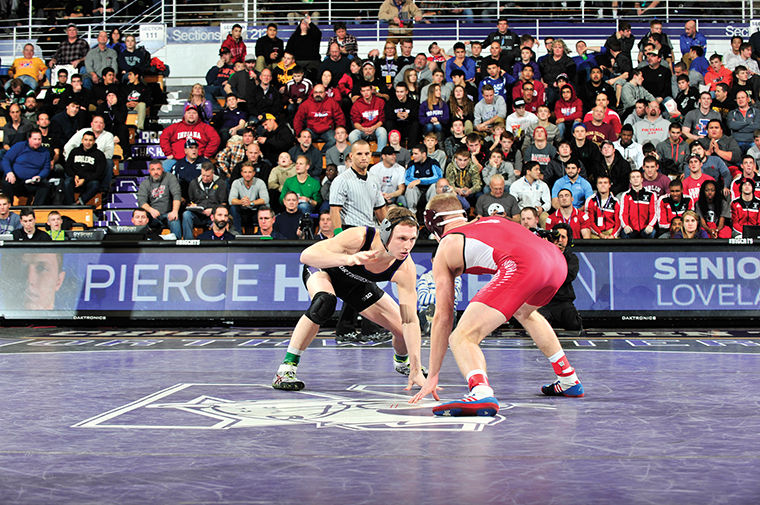Featured Athlete: Pierce Harger
Courtesy Stephen J. Carrera/Northwestern Athletics
Featured Athlete: Pierce Harger
January 26, 2015
Pierce Harger, a fifth-year senior at Northwestern University double majoring in economics and industrial engineering, has been wrestling since the age of four.
Originally from Cincinnati, Ohio, Harger was recruited to the Northwestern wrestling team out of high school and has been a starter for the past four years. Last year, in his third season, Harger gained all-American status from the NCAA after placing eighth out of the top 33 collegiate-level wrestlers in the nation.
The Chronicle spoke with Harger about college-level wrestling, balancing athletic commitments with schoolwork and how to handle competition at the college level.
THE CHRONICLE: How did you get into wrestling?
PIERCE HARGER: My older brother wrestled, too, and I was always at the gym because of him. I played football and baseball as a kid and did gymnastics as well through eighth grade.
How has the team performed nationally since you have been involved?
PH: My first two years, we kind of bounced around twelfth or thirteenth in the country finishing up with NCAA. I’ve qualified for NCAA every year so far. As a team, we’ve been progressing.
Is wrestling more competitive at the college level?
PH: The competition in high school is good, but once you get into college it’s a whole other level. Like any other sport, everyone is training at the highest level. Considering that for wrestling there is only the Olympics—and some guys will pursue mixed martial arts—and college wrestling in most cases is one of the pinnacles of most wrestling careers. We don’t have an NFL or NBA, so this is the time for guys to work their hardest to shine and do their best. I think it’s more competitive, especially being in the Big 10, which is considered to be the best conference year in and year out for college wrestling. You have to be on your game, have to be up at your best level every single week, which is stressful but at the same time makes it a whole lot more fun.
How do you balance your athletic commitments with classes?
PH: Most weeks we’ll have practice in the early- or mid-afternoon every single day and usually one or two days a week we have mandatory strength training at 6:30 a.m. I also try to get in one or two other individual workouts with a coach to focus on technique or conditioning. Classes are jammed in between training, you grab lunch and dinner afterwards and no matter how tired you are, you make it to the library or the computer lab to study and do homework. Professors don’t really care if you had a competition over the weekend, and that’s something you have to learn pretty quickly. You’ve got to plan out your time and focus because you can’t go to bed at three or four in the morning like other students can.
What do you love about wrestling?
PH: From an early age you learn a lot about yourself through wrestling, as well as pick up extra skills. It’s not just clubbing people over the head, but learning how to handle wins and losses, how to handle stress and confidence even from a young age because once you’re in a wrestling match, you’re pretty much out there on your own. It’s not like your teammates can help you. No one is going to throw you a pass or assist you on a take down. It is a big thing—you have to own all of your losses and own all of your wins. It can be tough when you lose because no one else can really grasp what’s going through your head. At the same time, when you win, it is something no one else can take away from you. It’s like you did it yourself.








